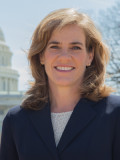 By General Counsel K. Hollyn Hollman
By General Counsel K. Hollyn Hollman
These are trying times to promote “religious liberty for all” as the BJC mission statement demands. Many of the current challenges on the legal and cultural fronts are not conducive to easy answers. Same-sex marriage, objections to health insurance coverage for contraception, religious extremism abroad, and a growing proportion of Americans that do not identify with any religion all seem to be taking a toll on our shared vision for religious liberty.
There are no quick fixes for these issues. There is, however, a strong need for deliberate dialogue and the affirmation of core principles to keep our differences from dividing us too deeply. To protect this cherished aspect of our country’s foundation, we need to understand and appreciate it, think about how our rights are tied to the rights of others, and engage more thoughtfully with people from different perspectives about how best to protect everyone’s religious freedom.
First of all, we must not take for granted that people understand what religious freedom means. Misinformation is rampant. There is a distinct way that America protects religious freedom — a way that allows people from vastly different beliefs to live peaceably with each other. We start with the first 16 words in the Bill of Rights: “Congress shall make no law respecting an establishment of religion, or prohibiting the free exercise thereof;” making clear that the role of government in religious matters is limited. While a majority of Americans are religious, far fewer understand how religion is protected by law.
At the core of our religious liberty is an individual’s right to believe and worship in accord with one’s conscience, without the interference of the government. That is the separation of church and state that Baptists have long championed. As Colonial Baptist Isaac Backus asked: “Now who can hear Christ declare, that his kingdom is, not of this world, and yet believe that this blending of church and state together can be pleasing to him?”
Second, robust religious liberty also means the right to exercise or act upon one’s religious convictions. Diversity of religious expression has always been a hallmark of our country. Standing up for religious liberty does not mean you agree with all the expressions of religion you see. But if we expect the government to protect us, we should ask the government to protect others. As Baptist preacher John Leland preached in the 18th century: “Let every man speak freely without fear, maintain the principles that he believes, worship according to his own faith, either one God, three Gods, no God, or twenty Gods; and let government protect him in so doing … .” We cannot expect uniformity in matters of religion. Even within our own tradition, there are important differences. As early Baptist and founder of Rhode Island Roger Williams said, “[A]n enforced uniformity of religion … denies the principles of Christianity and civility … .”
Third, while it is difficult to find common ground with those with whom you disagree, religious liberty is a good place to make the effort. People on opposite sides of the political aisle and those with very little else in common may want the same things for themselves when it comes to religion, such as the ability to believe and act in accordance with their conscience, equal rights under the law, and a government that does not take sides in religious disputes.
Despite the challenges we face, we know that religious liberty is too important to quit working for its protection. Since the founding era, Baptists have played a crucial role, providing a strong voice standing up to those who would oppress in the name of religion and declaring the importance of religious liberty for all. We should appreciate that, while religious matters are reserved to individuals and faith communities with little room for governmental regulation or interference, it is not always easy to draw the lines marking boundaries. As the U.S. Supreme Court has noted, the First Amendment embraces both the freedom to believe and the freedom to act: “The first is absolute but, in the nature of things, the second cannot be.” Religious liberty certainly does and should extend beyond the house of worship doors. But understanding its breadth and limits is not easy. The good news is that Baptists have a long, proud history of contributing to the vitality and understanding of our country’s religious freedom, a legacy that the BJC and its supporters are committed to continuing.
From the June 2015 Report from the Capital. Click here to read the next story.





